The world is rapidly moving towards a tech-based society. Every business enterprise needs to maintain its online presence to survive the tough competition, you need the best server to do that. When choosing a dedicated server that would be a perfect fit, you need to keep several elements in mind.
Hosting on a dedicated server provides a lot of benefits and the most important benefit is that this hosting platform is completely dedicated to one account. A dedicated server is a lucrative investment for future business growth.
How do you decide on the right server specifications? Let’s get a deeper insight into this!
What Is A dedicated server?
A dedicated server is a remote server that is fully dedicated to your website, application, or organization. In the case of a dedicated server, you don’t need to share any resource with any other ‘tenant’. The dedicated server functions as an in-house server. However, it is managed and operated by your hosting provider. You as a user have complete control of the server resources to configure as you choose. This type of server can be used to host high-traffic websites, services, or applications and also for data storage.
Why Choose A Dedicated Server?
The biggest advantage of a dedicated server is that you enjoy a “single-tenant hosting environment”. This type of server empowers you through benefits over the other hosting platforms:
- Security of your online business is the priority if you are running an ecommerce business with sensitive data of customers. Dedicated servers guarantee enhanced security than shared servers which are more prone to cyber-attacks or hacks.
- Faster page load can be an advantage and slow page load is a negative factor for your application. With a dedicated server, your page loading gets a boost even during traffic spikes.
- You can configure the dedicated server as you like choosing OS, storage capacity, and type.
Related: Tips For Selecting The Best Linux Dedicated Server
How To Decide Dedicated Server Specifications?
When you make up your mind to opt for a dedicated server for your business, it is time to decide its specifications. Choosing the right specifications is the primary task as they enable you to fully configure the server as per your business requirements. The major concerns before choosing the right dedicated server are:
CPU
The CPU is like the heart of any server, needless to say. If you want high performance from your server, the first step will be to choose the right CPU option. The main two server CPU brand options are Intel and AMD. However, from a performance perspective, some researchers reveal their contrast. Intel’s processors have outdone AMD processors in single-core raw power in previous years; CPUs of AMD have made remarkable improvements in their core count and threads.
Core Count & Clock Speed Of CPU
Not only the brand of CPU but some key factors like core count and clock speed of dedicated server CPU also should be considered. CPUs have different numbers of cores that denote the number of individual processors that are located on that server. A processor with a higher core count always performs best with better read and write speeds. Some dedicated servers can offer you up to 128 cores. However, some single-thread applications can’t fully utilize all the cores, though the higher cores give you a little satisfaction.
In the case of clock speed, prefer processors with a high clock speed, 2.8 GHz or faster with hyper-Threading; and 2.3 GHz or faster without hyper-threading.
RAM
The RAM allows space for your server to write and read information to be retrieved by the CPU. Judicious selection of RAM is important like choosing the CPU. The more RAM you have, the less CPU needs to read data from the hard disk of your server. As a result, you are bestowed with a higher speed of your dedicated server and your hosted services never get slow for your users. There is no specific rule that advises you about the RAM of your dedicated server. You can consider the following factors to make a decision:
- Number of concurrent users of your application or website
- Size of database(s)
- Rate of growth of your business and database
- OS requirements
- Additional operational software on your server
As a general rule, choose at least 16 or 32 GB RAM if your application experiences a lot of traffic. If you don’t find it enough, you can opt for an upgrade.
Storage Type
You can go for either a hard drive (HDD) or a solid-state drive (SSD) storage. You should carefully consider their benefits and drawbacks. In the last few years, the popularity of SSDs has grown rapidly as they offer excellent performance in absence of moving parts like HDDs. On the other hand, HDDs can take a higher time to read and write in presence of a read/write head on the platter.
SSDs beat HDDs at ease from a capacity, lifespan, and performance standpoint. However, it is important to look for an affordable SSD dedicated server. Anyway, the SSD with newer technologies comes with a little higher cost as compared to its traditional counterparts, and day by day the price difference is getting narrowed.
Related: Dedicated Server SSD Vs. HDD: What’s The Difference?
Network Speed
A dedicated server with a fast network speed is most sought after, as a fast network speed confirms fast data travel to and from your server. You obviously would not like to keep your viewers waiting for a page to load. No one likes to wait for buffering while watching an exciting video. This issue can be resolved with a dedicated server with high network speed. You can expect 5GBPS or 10GBPS network speeds from most hosting providers. It is advisable to choose a dedicated server with a speed of 10GBPS or higher for an unmatched hosting experience.
Bandwidth
The volume of data that can be transferred in one period of time is the server bandwidth. All users of your hosted services receive and send data through your server. To provide a smooth browsing experience to your users, you must opt for enough bandwidth for your dedicated server to accommodate everyone.
Not only the number of users but the type of hosted data should also be considered for deciding bandwidth. To be more specific, emails need very little space; but hosted video files need larger bandwidth. As a universal rule, a dedicated server plan with 10-100GB bandwidth will be enough in case you’re hosting a smaller website. The situation changes for ecommerce websites, online education portals, or video streaming websites. An unmetered dedicated server will suit you best in this case.
Server Location
Your server should be located at the closest location to most of your users. As the distance between your server and users increases, the higher the latency your viewers are going to experience. They are going to experience higher page loading time while opening your hosted website, and more lagging in case of a gaming server. Hosting your website or application on the dedicated server nearest to your site visitors has the following advantages except for shorter page loading duration:
- The server location in web hosting is a vital factor in SEO and higher ranking in search engine SERPs, as those sites have a unique format and targets for a particular country, region, or audience.
- Faster web page loading in a dedicated server close to your location will generate more leads and the conversion rate will be also higher.
Hosting Partner
The hosting partner of your dedicated server is like your friend in distress. The IT experts of the best hosting provider will help you with the utmost commitment and dedication. Consider the factors mentioned below before you choose your dedicated server.
- How fast your hosting partner can provide you with technical support when issues arise?
- If they can offer 24/7 technical support
- How much uptime do they promise? 99%, 99.99%, or even 100%.
Related: Top Five Benefits Of Fully Managed Dedicated Server
Performance Requirements
Every company has different performance requirements for its servers. It is like a combination of all the specifications of your dedicated server or a final call for a final decision. Carefully find answers to some questions like how many visitors you expect to have for your website, what kind of hosting services you need, your services will be CPU or RAM or storage or bandwidth-intensive. Knowing the answers to all these questions will give you a better insight into the specifications of your dedicated server.
Conclusion
The insights mentioned in this article will help you to choose the right specifications for your dedicated server. Two final things to consider before we conclude are cost and your specific requirements. After having a better understanding of CPU, RAM, storage, and bandwidth, you can make a more informed decision now. A dedicated server is a long-term investment and you have to make the right decision in terms of server resources and your hosting partner.







